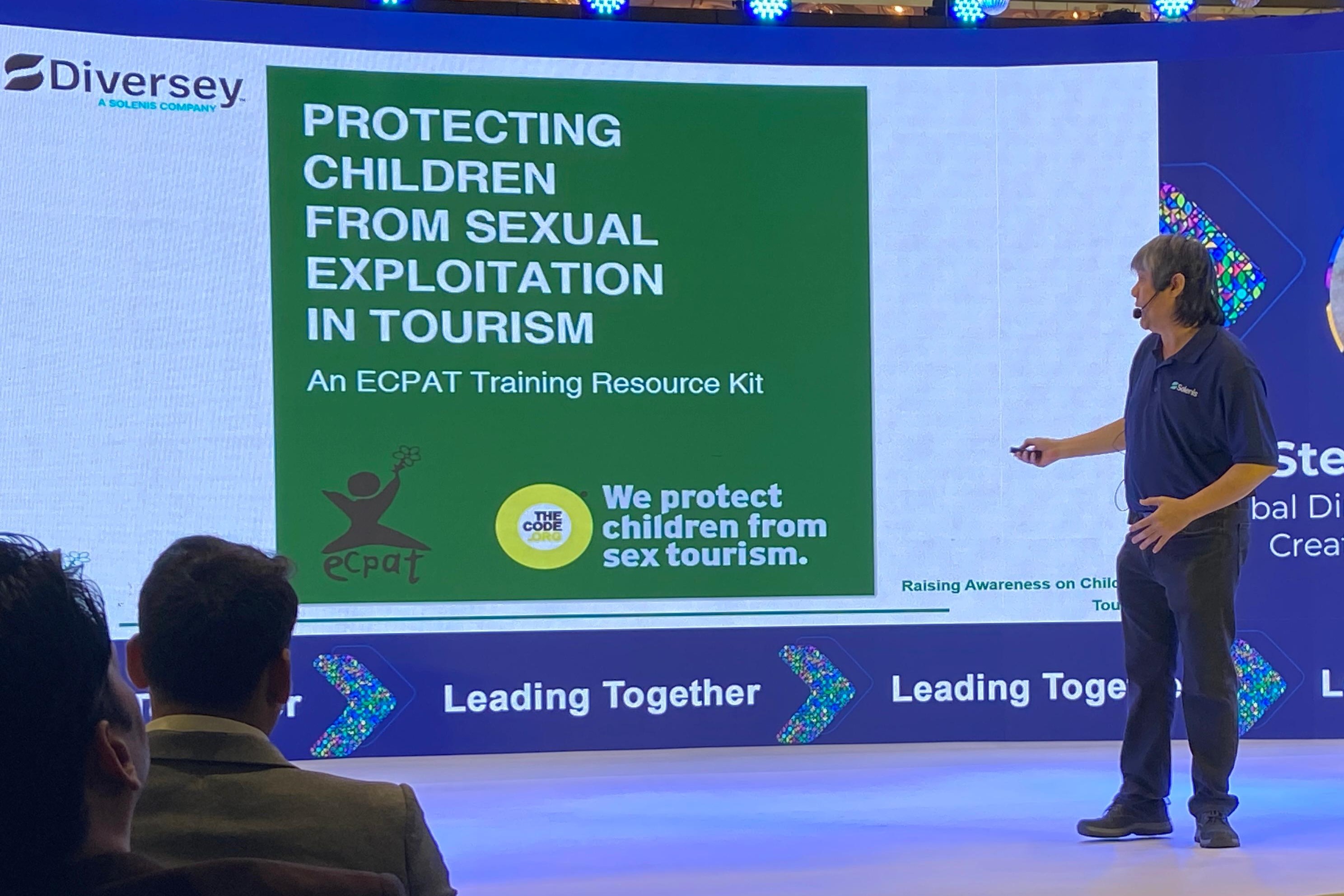At Solenis we work closely with our customers to address their sustainability challenges including social responsibility. In the hospitality sector, that includes supporting training programs that raise awareness of child sexual exploitation in tourism. This work responds directly to growing interest from hotel partners who want to foster safe and responsible environments for their guests and communities.
It’s a difficult topic, but one we must address. Responsible travel is not just about reducing carbon footprints. It’s about making sure children are safe where tourists stay, eat, and relax.
Child Protection as a Core Element of Responsible Tourism
Many hotel brands have committed to the Global Sustainable Tourism Council (GSTC) standards, which align with the United Nations Sustainable Development Goals (SDGs). These frameworks are essential to building ethical, sustainable travel experiences.
- UN SDG 16.2: End abuse, exploitation, trafficking, and all forms of violence against children
- GSTC Standard B5: Prevent all forms of exploitation or harassment, particularly of children and vulnerable groups
But pledging support is just the beginning. Real protection requires real action.
Because this issue is most closely associated with the tourism sector, our awareness efforts have focused on hotels, where employees are uniquely positioned to recognize and respond to risks.
A Longstanding Hotel Training Program Making a Difference
Since 2014, a training program originally developed by Diversey and now supported by Solenis has been addressing child exploitation in the tourism and hospitality sectors. It is one of several ways we work alongside hotel partners to deliver sustainability strategies that also advance human rights and community well-being.
The Anti-Sexual Exploitation of Children in Travel and Tourism (Anti-SECTT) program equips hotel staff with the tools to:
- Identify signs of child sexual abuse
- Intervene safely and effectively
- Report concerns to local authorities
Hundreds of hotel workers across more than 22 countries have received this training. It is led by Dr. Stefan Phang, vice president of creating shared value and sustainability at Solenis and a child protection advocate with the International Child Protection Network (ICPN).
Why Child Exploitation Persists in Tourism
Despite the best intentions of global hotel brands, child sexual exploitation remains a threat in many popular travel destinations. The reasons are complex:
- Poverty and lack of opportunity make children more vulnerable
- Many hotels operate in regions where law enforcement is inconsistent
- Staff are often not trained to recognize or respond to red flags
- Staff may be afraid to confront perpetrators for fear of losing their jobs
- Perpetrators exploit tourism’s anonymity and rapid guest turnover
These risks are present across high-end resorts and budget accommodations alike. Without proper training, warning signs are easily missed.
Survivor-Informed Hotel Staff Training
What makes this program unique is its use of real-world case studies. These scenarios are based on interviews with:
- Survivors of child sexual abuse in tourism
- Hotel staff who’ve witnessed suspicious situations
Through role-playing exercises, hotel employees learn to:
- Spot subtle warning signs
- Interact appropriately with children at risk
- Approach and report suspicious adults
- Coordinate with local authorities
The goal is not only awareness but action—confident, immediate, and appropriate action.
Real-World Impact
“The Anti-SECTT training led by Dr. Stefan Phang was an impactful and highly relevant experience for our team. It raised awareness of a difficult issue and provided clear, practical guidance on how to recognize warning signs and respond appropriately.
Stefan delivered the session with professionalism and empathy, creating an environment where staff felt comfortable engaging with a sensitive topic. I would strongly recommend this training to any hotel serious about protecting guests, employees and the broader community.”
-Thomas Christiansen, general manager at Dusit Thani Pattaya, Thailand
Program Reach and Measurable Results
This hotel training program has reached employees in over 22 countries. It has been embraced by global hospitality chains, local tourism ministries, and law enforcement agencies as a practical and effective approach to child protection in tourism.
It is now considered a model for how sustainability and human rights intersect in the hospitality industry.
Addressing Root Causes with Waste-to-Income Initiatives
To help reduce the vulnerability that leads to exploitation, Solenis also supports several waste-to-income programs that offer economic alternatives to families at risk.
These include:
By converting hotel waste into sustainable products, these programs create local jobs and help families avoid desperate, high-risk choices that may endanger children.
Tourism Should Never Come at a Child’s Expense
Tourism should create opportunity—not danger.
It should bring communities together—not expose their most vulnerable to harm.
Preventing child exploitation in travel and tourism requires transparency, action, and the willingness to confront uncomfortable realities. Solenis is proud to support this work, and proud of the hotel partners who take it seriously.
Join the Movement
If you are part of the hospitality, travel, or tourism industry and are looking for support in addressing this issue with your staff and community, connect with us. Together, we can support safe and dignified travel for everyone.
Hotels interested in training or partnership can contact your Diversey account manager or email Dr. Stefan Phang at sphang@solenis.com
